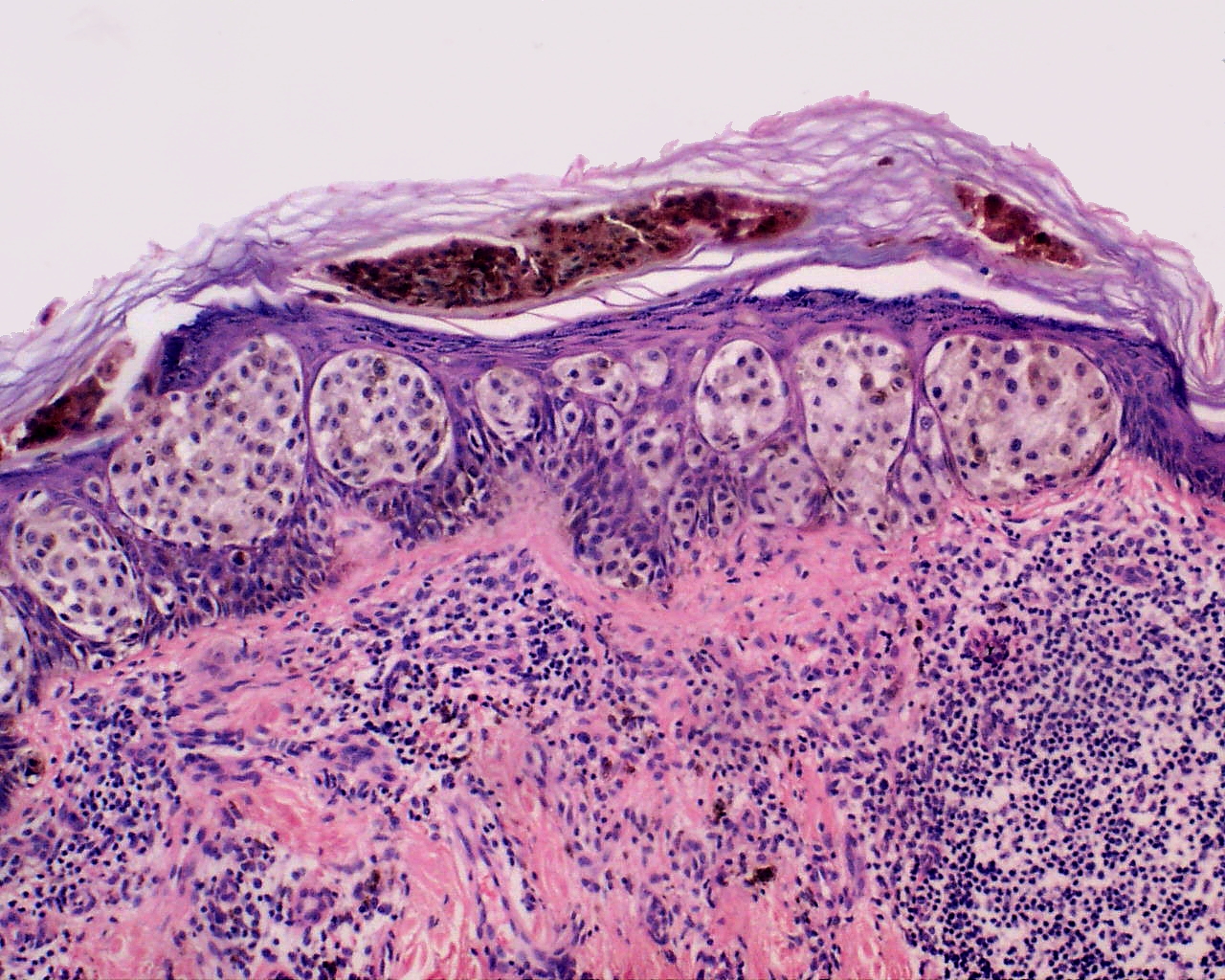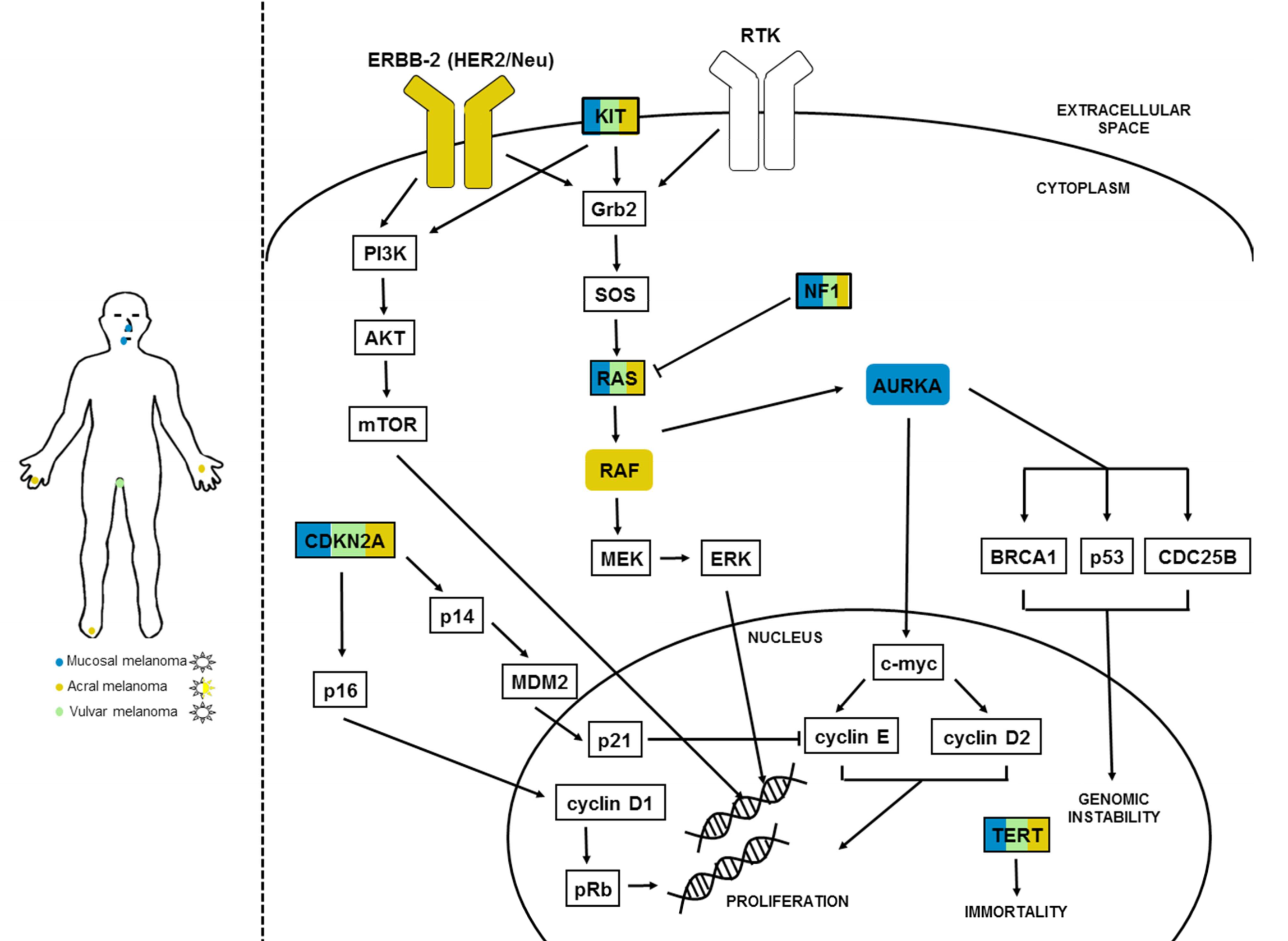August 5, 2019 | Jola Glotzer
Pathogenesis of sun-protected melanomas
CBC Senior Investigator, Kevin White, UChicago (currently Tempus), investigates genetic heterogeneity of sun-protected melanomas

Superficial spreading melanoma. (Source: Wikimedia Commons)
Melanoma — a type of skin cancer that derives from pigmented cells called melanocytes — is primarily caused by DNA damage resulting from the skin exposure to the UV light (sun, tanning). This cancer may also occur on the body areas which are typically protected from the sun, such as mucosal membranes or intestines. It is the most dangerous of skin cancers. If detected early when the disease is localized, and is treated aggressively, the 5 year-survival is 99%. However, the rate falls to 25% in more advanced metastatic melanomas.
In a recent paper, “Distinct Genomic Features in a Retrospective Cohort of Mucosal, Acral and Vulvovaginal Melanomas,” published in the Journal of the American Academy of Dermatology, the authors look into the pathogenesis of sun-protected melanomas. They discovered significant genetic heterogeneity in the cancer samples studies, with mucosal melanomas showing a distinct up-regulation of cell cycle and proliferation genes, in good agreement with the aggressive clinical behavior of this type of melanoma.
Kevin White, currently Chief Scientific Officer of a biotech start-up Tempus Labs, is one of the co-authors on the paper. He was recruited to UChicago in 2006 with help of a generous CBC Resources Fund Award, and was also designated the first CBC Senior Investigator. In addition, he received a CBC Lever Award (2008) for the project: “Chicago Center for Systems Biology (CCSB).” White was an invited speaker at CBC Science Day (2011) and the 4th Annual CBC Symposium (2006) on “Infrastructures for Systems Biology.” He also served on the CBC Proteomics Informatics Scientific Board (2007-2009) and the CBC Spark Council (2008-2011). The CBC is grateful for Kevin’s time and dedication while serving on CBC boards and for his support of the CBC programs and mission.
Publication linked to the CBC funding*:
Shi K, Zhang B, Kong BY, Zhang Y, Igartua C, Mohan LS, Quan VL, Panah E, Isales MC, Beaubier N, Taxter TJ, White KP, Zou L, Gerami P. Distinct Genomic Features in a Retrospective Cohort of Mucosal, Acral and Vulvovaginal Melanomas. J Am Acad Dermatol. 2019 Jul 12. [Epub ahead of print] (PubMed)
ABSTRACT:
BACKGROUND: Compared to sun-exposed melanomas, less is known regarding the pathogenesis of sun-protected melanomas. Sun-protected melanomas share many epidemiologic factors but their genetic heterogeneity is not well studied.
OBJECTIVE: We investigated the genomic profile of acral, mucosal and vulvovaginal melanomas. We hypothesize that mucosal melanomas, recognized for their uniquely aggressive clinical behavior, have distinct genomic features.
METHODS: We performed whole transcriptome mRNA and DNA (1711 genes) sequencing, mRNA expression profiling, TMB, UV signature and CNV analysis on 29 volar/digital acral, 7 mucosal and 6 vulvovaginal melanomas.
RESULTS: There was significant genetic heterogeneity, particularly in acral melanomas with 36% having BRAF alterations while other melanomas had none (p = 0.0159). Nonzero UV signatures were more frequent in acral melanomas, suggesting greater UV involvement. Mucosal melanomas formed a distinct group with increased expression of cell cycle and proliferation genes. Various targetable aberrations were identified such as AURKA and ERBB2 in mucosal and acral melanomas, respectively.
LIMITATIONS: There was a small sample size.
CONCLUSION: There is significant genetic heterogeneity among sun-protected melanomas. Mucosal melanomas have upregulation in cell cycle and proliferation genes, which may explain their aggressive behavior. Ultraviolet radiation plays some role in a subset of acral but not other melanomas.

Sun-protected melanomas molecular signaling pathways of key genes. (Source: www.sciencedirect.com)
Featured CBC Community member(s):
Kevin White, UChicago
- ▸ CBC Science Day (2011):
Kevin White (UChicago) — Science Day Speaker - CBC Lever Award (2008):
▸ Chicago Center for Systems Biology (CCSB)
PIs: Kevin White (UChicago), Robert Grossman, (UChicago; at UIC then), Richard Morimoto (NU) and Luis Amaral (NU) - Spark Council (SC; 2008-2011):
Kevin White (UChicago) — Council Member - Proteomics Informatics Scientific Board (PISB; 2007-2009):
Kevin White (UChicago) — Board Member - 4th Annual CBC Symposium (2006):
▸ Infrastructures for Systems Biology
Kevin White (UChicago) — Symposium Speaker - *CBC Recruitment Resources Award (2006):
▸ CBC Senior Investigator
Kevin White (UChicago)
ARTICLES PUBLISHED IN THE PAST ABOUT THE FEATURED CBC COMMUNITY MEMBER(S):
June 13, 2019
▸ Germline genetic risk variants and carcinogenesis
Kevin White, CBC Senior Investigator, UChicago and President of Tempus Labs, contributed to a recent study in the International Journal of Cancer, which examined associations between germline variants and somatic mutation signatures in breast cancer across a wide range of populations and geographic locations
June 7, 2019
▸ Noncoding RNA and cancer
CBC Senior Investigator, Kevin White, UChicago and Tempus, demonstrates that post-transcriptional editing of noncoding RNA, seen in many types of cancers, may actually play a role in carcinogenesis itself
November 11, 2017
▸ Chicago-based Tempus shows why Midwest healthcare companies drew preferential investment in 2017
November 5, 2017
▸ CBC cancer researchers and Globus will develop a HIPAA-protected cloud database to share collaborative cancer research
February 1, 2017
▸ January 2017 CBC-funded publications
Twenty peer-reviewed research papers acknowledging CBC funding were published in January 2017. Congratulations to all!
March 24, 2014
▸ Study Reveals a Major Mechanism Driving Kidney Cancer Progression
Misplaced protein provides promising drug target
